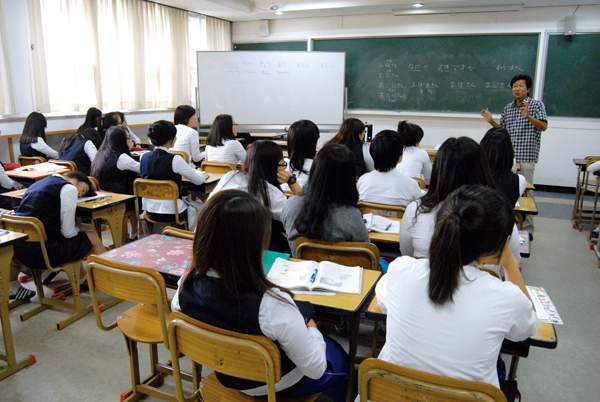
- Updated 2024.5.16 16:06
- All Articles
-
member
icon
-
facebook
cursor
-
twitter
cursor
|
CommunityInterviews |
Life as a Korean study zombieAn insider’s view of the sacrifices necessary to gain SPHS entry |
|
| |
 |
|
| ▲ Photo by Yang Ho Geun |
The author is preparing to enter university in the US and is a Jeju Weekly intern reporter and translator.
A foreign language high school is a type of a Special-Purpose High School (SPHS) designed to concentrate on specific subjects: foreign language, science, or fine arts. In reality, it refers to the most elitist and competitive institutions that mass-produces top-notch college acceptances. In some of the more popular SPHS in the Seoul area, less than 5 percent are accepted.
I agreed to my mother’s suggestion to apply so that I would be surrounded by a bright and motivated peer group, which is the premise of these schools. As a result, I had to sign up for an extensive list of private academies, known as hagwon. There was a pricey abundance of them that specialized in SPHS admissions; the hagwon industry is almost like iPhone apps — they branch out by the split-second into anything marketable.
I would have preferred not to spend that money, but the word on the street was that applicants with a TOEFL (Test of English as a Foreign Language) score under 100 would not be considered competitive. Considering Yale University’s TOEFL score requirement for international students is 100, this really was an outlandish standard for 16-year-olds. I was left with no choice, since there was no way this could be achieved by studying with my middle school English teacher.
After a meeting with a hagwon counselor who anxiously asked me about my English grades before asking my name, I was placed in a class with their best and brightest with whom I shared a mission. Almost every night I stayed up until 4 a.m. in a large hagwon classroom strenuously studying with some 50 other applicants, all wearing similar zombie-like facial expressions.
No wonder I was dozing off in school, if not falling down like a corpse! It was all okay though; the teachers tacitly supported SPHS applicants and didn’t bother waking us up. Some urban middle schools went as far as to giving the applicants “field trip days” or “special classrooms” where they can be isolated from the regular curriculum. Schools made exemptions for us as long as we got in and contributed to their reputation.
I got rejected from my first choice school with an expensively earned TOEFL score of 107. Fortunately, I followed my admission strategist’s advice (there’s a hagwon for that!) to tactfully apply to a second choice and got accepted at a local SPHS. My teachers were heartbroken that the opportunity to pave the golden road for me had slipped.
After I enrolled, I was to discover that my supposedly bright and motivated colleagues were the same fellow zombies that I had met at the hagwon. They were just a tad more obsessed with getting perfect scores now that they were burdened with a sense of entitlement, being officially top-notch. Just like our exam preparation days, our lives gravitated around various hagwon until 2 a.m.
I attempted to save my 17-year-old youth by joining a theater club. The club was such an annoyance to the faculty and the parents. Many of the members got pulled out midyear by their parents because the activity was stealing a couple hours away from their study time. Nevertheless, we won the National Youth Theater Festival which made our headmaster truly happy. She smiled and warmly told us that the awards will give us a significant boost in college application. I was petrified to see the prophecy come true when one of the senior members got accepted to a top college thanks to that award.
Many of my zombie friends have now graduated, yet those who got rejected from their first choice college are now studying another year for the College Scholastic Aptitude Test — the ultimate annual exam of incomparable magnitude to be successful in this society. I don’t see them around too often because they are studying and living in hagwon dormitories (again, there’s a hagwon for that!) which are located in the country-side to minimize study disturbance.
I hope that I didn’t give the impression that I have a low opinion of my hagwon-zombie friends. Sadly, I don’t have the luxury to for I haven’t known, nor heard, of any other kind.
|
|
|
|
|
|
|
|
ⓒ Jeju Weekly 2009 (http://www.jejuweekly.net)
All materials on this site are protected under the Korean Copyright Law and may not be reproduced, distributed, transmitted, displayed, published without the prior consent of Jeju Weekly. |
|
|
|
|
| Jeju-Asia's No.1 for Cruise |
|
|
|
Title:The jeju Weekly(제주위클리) | Mail to editor@jejuweekly.net | Phone: +82-64-724-7776 Fax: +82-64-724-7796
#503, 36-1, Seogwang-ro, Jeju-si, Jeju-do, Korea, 63148
Registration Number: Jeju, Ah01158(제주,아01158) | Date of Registration: November 10,2022 | Publisher&Editor : Hee Tak Ko | Youth policy: Hee Tak Ko
Copyright ⓒ 2009 All materials on this site are protected under the Korean Copyright Law and may not be reproduced, distributed, transmitted, displayed, published
without the prior consent of jeju weekly.com.

|




















